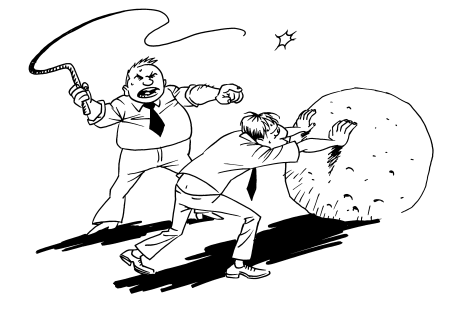 In 2011 we conducted a study of 1,000 Danish employees from a wide variety of workplaces to try to find the biggest factors that make people unhappy at work. Our study found that the second biggest driver of dissatisfaction at work was a lack of praise and recognition. Too many Danish employees are unhappy and demotivated at work because, even though they do great work, they hardly ever receive any positive feedback and I’m willing to bet good money that this applies in most other countries too.
In 2011 we conducted a study of 1,000 Danish employees from a wide variety of workplaces to try to find the biggest factors that make people unhappy at work. Our study found that the second biggest driver of dissatisfaction at work was a lack of praise and recognition. Too many Danish employees are unhappy and demotivated at work because, even though they do great work, they hardly ever receive any positive feedback and I’m willing to bet good money that this applies in most other countries too.
That’s a damn shame because studies confirm that workplaces that have a culture of recognition are happier, have lower absenteeism and are more successful.
So we need more praise at work, sure, but that’s not enough. It’s also about better praise. We won’t create a viable culture of recognition in a workplace simply by increasing the amount of praise given, we must also improve the quality of the praise.
It is actually possible to praise employees and co-workers in ways that make them less happy at work.
Here are the top 5 ways NOT to praise people at work. Do you recognize any of these from your workplace?
1: Obligatory praise
Never praise people just because you feel you should. Praise has to be meaningful and earned. This means you can only praise others when there is a good reason to do so – which fortunately is quite often.
Praise given because you have to and not because you feel the person has earned it makes no one happy at work. It will also undermine all future praise, because people can’t trust it to be honest.
Also, some people will only give praise and tend to avoid giving negative feedback, possibly in an attempt to avoid unpleasant conversations and conflict. That won’t do. Our study showed that people long for feedback at work. They want to know what they do well but they also want to know what they can do better.
2: Sarcastic praise
Imagine this said in a wildly sarcastic tone: “Wow, you just did an awesome job on that, didn’t you?”
That’s not very likely to make anyone happy at work.
3: Praise mixed with criticism
Have you ever heard that you should preface any criticism with praise? Some people argue that the best way to give negative feedback is to wrap it in praise, i.e. you should praise, criticize and then praise again at the end.
I disagree completely with that approach. I say if you have negative feedback, say so. If you have praise to give, do it. But don’t feel like you have to mix the two.
The problem is this:
- The praise you do give seems fake – it’s just a preamble to the real message.
- It seems like you think people can’t take criticism since you wrap it in praise to soften the blow.
- In the future when you praise people, they’ll just be waiting for the hammer to drop.
4: Praising some – ignoring others
If some people get tons of praise while others are consistently ignored, this is highly demotivating since it give the praise-less a feeling of unfairness and of being overlooked.
A classic example would be a company where the salespeople get all the praise for getting new customers while the people working in the backoffice, who make the sales possible, are routinely ignored and taken for granted.
Unfortunately it’s easy to end up praising only those people who get the most visible results and ignoring the people backstage. Its also tempting to only praise the people who are most like you, who do work you immediately understand and who do it the way you would have done it. Therefore we should all make an extra effort to appreciate the people who are not like us.
This is not to say that praise should be handed out evenly so everyone gets the exact same amount of recognition. In any workplace, there will be people who shine and it’s perfectly alright if they get more praise. But it’s important that everyone gets noticed and praised for the good work they do.
5: Trivial praise
I once talked to a woman who got lots of praise from her male supervisor at her last job… but only ever for her looks. This was both creepy and utterly meaningless. She’s a highly skilled professional and she wants to be recognized for that – not for something as trivial as how she looks.
So make sure you praise people for things that actually matter to them and not for superficial matters and trivial accomplishments.
Your take
Have you ever been praised in a way that made you less happy at work? Does your workplace have a good culture of recognition? What’s the best way you’ve ever given or received praise at work? Write a comment, we’d love to know your take.










 You can put one hand over the lower part of your face and your mouth. To an outside observer you will look thoughtful and observant. In reality your holding your mouth forcibly shut. It’s a simple physical reminder to yourself to not speak right now.
You can put one hand over the lower part of your face and your mouth. To an outside observer you will look thoughtful and observant. In reality your holding your mouth forcibly shut. It’s a simple physical reminder to yourself to not speak right now.